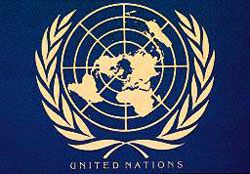 The United Nations’ probe of the assassination of Prime Minister Rafiq Hariri in Beirut has emboldened Lebanon’s activists to demand the release of at least 1,500 Lebanese nationals allegedly imprisoned in Syria. "This is a blatant violation of UN Security Council Resolution 1559," said Claude Hajjar, Beirut representative of the Guardians of the Cedars, the Lebanese political party that campaigned vigorously against the 30-year-long Syrian military presence in her native land. She came to Cyrpus from Beirut to confer with her party’s leader, Etienne Sakr, popularly known as Abu Arz, who has been living there in exile.
The United Nations’ probe of the assassination of Prime Minister Rafiq Hariri in Beirut has emboldened Lebanon’s activists to demand the release of at least 1,500 Lebanese nationals allegedly imprisoned in Syria. "This is a blatant violation of UN Security Council Resolution 1559," said Claude Hajjar, Beirut representative of the Guardians of the Cedars, the Lebanese political party that campaigned vigorously against the 30-year-long Syrian military presence in her native land. She came to Cyrpus from Beirut to confer with her party’s leader, Etienne Sakr, popularly known as Abu Arz, who has been living there in exile.
Resolution 1559 also is the basis upon which a 60-member investigatory team led by Germany’s Detlev Mehlis has been trying to find out who was responsible for the 2,000-pound bomb that killed Hariri on February 14. It was detonated as he drove in a motorcade past the Lebanese capital’s posh St. George Hotel. The commission spent last Monday in Damascus and was expected to return for a longer stay early next week. Encouraged by the Mehlis commission’s probe, the Lebanese authorities have arrested four generals on suspicion of complicity in the plot to kill Hariri. They also detained Nasser Kandil, a former member of Parliament. He was released three weeks ago, but his passport was taken from him and he was ordered not to leave Lebanon.
A Sunni Muslim, Hariri was 60 years old when he died. He was a billionaire in his own right mainly due to investments in Saudi Arabia and served as prime minister five times. The assassination occurred while he was running for reelection.
He had resigned in October 2004, having aligned himself with the Lebanese public’s mounting resentment against Syrian hegemony, a feeling shared by Maronite Christians and Sunni Muslims. The Shi’ites of southern Lebanon were less hostile toward Syria and those who adhere to Hizbullah’s ideology appreciated the Damascus regime’s funding and arming of the extremist militia. Less than four months after giving up the premiership Hariri was dead.
"Several other anti-Syrian leaders have been staying away from Lebanon for the time being," Abu Arz said. Among them are Hariri’s son, Saad, who led and won the election campaign in the aftermath of his father’s death, and Samir Geagea, the former commander of the Lebanese Forces, who spent 12 years in prison, most of them in solitary confinement. His cell was in the basement of Beirut’s defense ministry. Both are in Paris.
The Lebanese Forces were a predominantly Christian militia that was allied with Israel in the 1982 war against the Palestine Liberation Organization’s cadres in Lebanon.
In addition, Sakr contended that the Lebanese Druse leader, Walid Jumblatt, and the Christians’ most popular candidate for the presidency, Michel Aoun, have been staying at home and rarely venture outside. "The Syrians want them dead," Sakr said.
Hajjar contended that the Syrian intelligence agency, known as the Mukhabarat in Arabic, has a list of 40 to 45 Lebanese on its hit list. "Jubran Tweini (editor of the prestigious Beirut daily a-Nahar) has all the names and told Lebanese TV (LBC) that he may publish it," she said.
Abu Arz believes that Syrian President Bashar Assad personally warned Hariri that he would be in grave danger if he persisted in opposing the tenure of Lebanon’s pro-Syrian President, Emile Lahoud.
A report carried by Channel 2 said Israeli and Jordanian intelligence forwarded data implicating Syria in the assassination.



